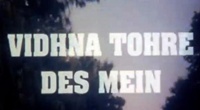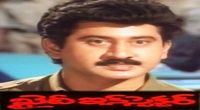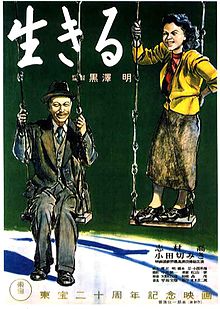Ikiru (???, "To Live") is a 1952 Japanese drama film directed and co-written by Akira Kurosawa and starring Takashi Shimura. The film examines the struggles of a terminally ill Tokyo bureaucrat and his final quest for meaning. The screenplay was partly inspired by Leo Tolstoy's 1886 novella The Death of Ivan Ilyich.
| Ikiru | |
|---|---|
Theatrical release poster | |
| Directed by | Akira Kurosawa |
| Produced by | S?jir? Motoki |
| Screenplay by |
|
| Starring |
|
| Music by | Fumio Hayasaka |
| Cinematography | Asakazu Nakai |
| Edited by | K?ichi Iwashita |
| Distributed by | Toho |
Release date |
|
Running time | 143 minutes |
| Country | Japan |
| Language | Japanese |
The major themes of the film include learning how to live, the inefficiency of bureaucracy, and decaying family life in Japan, which have been the subject of analysis by academics and critics. The film has received widespread critical acclaim, and in Japan won awards for Best Film at the Kinema Junpo and Mainichi Film Awards. It was remade as a television film in 2007.
Screenplay
Kanji Watanabe is a middle-aged man who has worked in the same monotonous bureaucratic position for thirty years. His wife is dead and his son and daughter-in-law, who live with him, seem to care mainly about Watanabe's pension and their future inheritance. At work, he's a party to constant bureaucratic inaction. In one case, a group of parents are seemingly endlessly referred to one department after another when they want a cesspool cleared out and replaced by a playground. After learning he has stomach cancer and less than a year to live, Watanabe attempts to come to terms with his impending death. He plans to tell his son about the cancer, but decides against it when his son does not pay attention to him. He then tries to find escape in the pleasures of Tokyo's nightlife, guided by an eccentric novelist whom he has just met. In a nightclub, Watanabe requests a song from the piano player, and sings "Gondola no Uta" with great sadness. His singing greatly affects those watching him. After one night submerged in the nightlife, he realizes this is not the solution.
The following day, Watanabe encounters a young female subordinate, Toyo, who needs his signature on her resignation. He takes comfort in observing her joyous love of life and enthusiasm and tries to spend as much time as possible with her. She eventually becomes suspicious of his intentions and grows weary of him. After convincing her to join him for the last time, he opens up and asks for the secret to her love of life. She says that she does not know, but that she found happiness in her new job making toys, which makes her feel like she is playing with all the children of Japan. Inspired by her, Watanabe realizes that it is not too late for him to do something significant. Like Toyo, he wants to make something, but is unsure what he can do within the city bureaucracy until he remembers the lobbying for a playground. He surprises everyone by returning to work after a long absence, and begins pushing for a playground despite concerns he is intruding on the jurisdiction of other departments.
Watanabe dies, and at his wake, his former co-workers gather, after the opening of the playground, and try to figure out what caused such a dramatic change in his behavior. His transformation from listless bureaucrat to passionate advocate puzzles them. As the co-workers drink, they slowly realize that Watanabe must have known he was dying, even when his son denies this, as he was unaware of his father's condition. They also hear from a witness that in the last few moments in Watanabe's life, he sat on the swing at the park he built. As the snow fell, he sang "Gondola no Uta". The bureaucrats vow to live their lives with the same dedication and passion as he did. But back at work, they lack the courage of their newfound conviction.
- Takashi Shimura as Kanji Watanabe (?? ?? Watanabe Kanji)
- Shinichi Himori as Kimura (??)
- Haruo Tanaka as Sakai (??)
- Minoru Chiaki as Noguchi (??)
- Miki Odagiri as Toyo Odagiri (??? ?? Odagiri Toyo)
- Bokuzen Hidari as Ohara (??)
- Minosuke Yamada as Subordinate Clerk Saito (??)
- Kamatari Fujiwara as Sub-Section Chief ?no (??)
- Makoto Kobori as Kiichi Watanabe (?? ?? Watanabe Kiichi), Kanji's brother.
- Nobuo Kaneko as Mitsuo Watanabe (?? ?? Watanabe Mitsuo), Kanji's son.
- Nobuo Nakamura as the Deputy Mayor.
- Atsushi Watanabe as a patient at the hospital.
- Isao Kimura as a medical intern.
- Masao Shimizu as the doctor.
- Y?nosuke It? as the novelist.
- Kyoko Seki as Kazue Watanabe (?? ?? Watanabe Kazue), Kanji's daughter-in-law.
- Kumeko Urabe as Tatsu Watanabe (?? ?? Watanabe Tatsu), Kiichi's wife.
- Noriko Honma as a housewife.
- Seiji Miyaguchi as the Yakuza boss.
- Daisuke Kat? as a Yakuza.
Living
Death is a major theme in the film, which leads to the protagonist Watanabe's quest to find the meaning of life. Initially, Watanabe looks to nightclubs and women to live life to the fullest, but winds up singing the 1915 song "Gondola no Uta" as an expression of loss. Professor Alexander Sesonske writes that in the nightclub scene, Watanabe realizes "pleasure is not life," and that a goal gives him new happiness, with the song "Happy Birthday to You" symbolizing his rebirth. Because Toyo is young, she has the best insight as to how to live, and is presented as the "unlikely savior" in Watanabe's "redemption."
Author Donald Richie wrote that the title of the film, meaning simply "to live," could signify that "existence is enough." However, Watanabe finds existence is painful, and takes this as inspiration, wanting to ensure his life has not been futile. The justification of his life, found in his park, is how Watanabe discovered how "to live." In the end, Watanabe now sings "Gondola no Uta" with great contentment.
Bureaucracy
Ikiru is also an "indictment of Japanese bureaucracy." In Japan after World War II, it was expected that the sarar?man (salary man) would work predictably in accordance with an organization's rules. The scene where the mothers first visit the city office requesting a playground shows "unconcern" in the bureaucrats, who send the visitors on a "farcical runaround," before asking them for a written request, with paperwork in the film symbolizing "meaningless activity." Despite this, Watanabe uses the bureaucracy to forge his legacy, and is apparently not disturbed when the bureaucracy quickly forgets he drove the project to build the playground.
Japanese health care is also depicted as overly bureaucratic in the film, as Watanabe visits a clinic in a "poignant" scene. The doctor is portrayed as paternalistic, and Watanabe does not stand up to his authority.
Family life
Author Timothy Iles writes that, as with Yasujir? Ozu's 1953 film Tokyo Story, Ikiru may hold a negative view about the state of family life in modern Japan. Watanabe has lived with his son for years, but they have fallen out of any true relationship. His son, Mitsuo, sees Watanabe as a bother, and sees him as standing in the way of money in Watanabe's will. The children fall short of their responsibility to respect their parents.
Urbanization may be a reason for negative changes in Japanese society, although a reason for Watanabe and Mitsuo's drift is also Watanabe's preoccupation with work. Another reason is Watanabe not being with Mitsuo during a medical treatment when the boy was 10, which fits a pattern in Kurosawa's films of sons being overly harsh to their fathers.
The film marked the first collaboration between director Akira Kurosawa and screenwriter Hideo Oguni. According to Oguni, the genesis of the film was Kurosawa's desire to make a film about a man who knows he is going to die, and wants a reason to live for a short time. Oguni was an experienced writer and was offered ¥500,000, while co-writer Shinobu Hashimoto was offered ¥150,000. Initially, Kurosawa told Hashimoto that a man who was set to die in 75 days had to be the theme, and that the character's career was less important, with the director saying criminal, homeless man or government minister would be acceptable.
The screenwriters consulted Leo Tolstoy's novella The Death of Ivan Ilyich, and Oguni envisioned placing Watanabe's death halfway through the film. Kurosawa dictated the scene where Watanabe is on the swing, and mentioned the beginning lyrics of "Gondola no Uta." Since none of the men were familiar with the song, they consulted their eldest receptionist on the rest of the lyrics and the song title.
Kurosawa renamed the draft The Life of Kanji Watanabe to Ikiru, which Hashimoto found pretentious, but Oguni supported. The screenplay was completed on 5 February 1952.
In Japan, Toho released the film on 9 October 1952.
Request Movie Now
Watch movie Ikiru online on Amazon
Watch movie Ikiru online
Watch The Movie On Prime
Garam Masala Full HD Movie Download

Kasam Teri Kasam Full HD Movie Download

Chhoti Bahu Full HD Movie Download

Dr Vidya Full HD Movie Download

Marshal Full HD Movie Download

Laat Saab Full HD Movie Download

Karz Chukana Hai Full HD Movie Download

Daulat Ki Jung Full HD Movie Download

Heer Ranjha (1970) Full HD Movie Download
.jpg)
Vidhana Tohre Des Mein Full HD Movie Download

Chitkabrey - Shades Of Grey Full HD Movie Download

Daku Rani Talwarwali Full HD Movie Download

Zameen Aasman (1972) Full HD Movie Download
.jpg)
Kanku Ni Kimat Full HD Movie Download

Rock Climber Full HD Movie Download

Jay Maa Full HD Movie Download

Khaidi Inspector Full HD Movie Download

Batman Begins Full HD Movie Download

Pelli Kanuka Full HD Movie Download

Eeswarudu Full HD Movie Download

Bhakta Pothana Full HD Movie Download


Download latest Movie from bollywood
Request for Download movie Ikiru
- Bollywood movies
- Latest Bollywood movies
- Download all bengali movies
- Download all bhojpuri movies
- Download all english movies
- Download all gujarati movies
- Download all hindi movies
- Download all kannada movies
- Download all malayalam movies
- Download all marathi movies
- Download all oriya movies
- Download all punjabi movies
- Download all tamil movies
- Download all telugu movies
- Bollywood action movies
- Bollywood adventure movies
- Bollywood animation movies
- Bollywood classical movies
- Bollywood comedy movies
- Bollywood crime movies
- Bollywood devotional movies
- Bollywood documentary movies
- Bollywood drama movies
- Bollywood family movies
- Bollywood fantasy movies
- Bollywood historical movies
- Bollywood history movies
- Bollywood horror movies
- Bollywood musical movies
- Bollywood mystery movies
- Bollywood mythological movies
- Bollywood patriotic movies
- Bollywood romance movies
- Bollywood romantic movies
- Bollywood sci-fi movies
- Bollywood social movies
- Bollywood spiritual movies
- Bollywood sports movies
- Bollywood suspense movies
- Bollywood thriller movies
- Bollywood war movies
- Hot actress list
- Hot gujarati actress list
- Hot tamil actress list
- Hot bhojpuri actress list
- Hot assam actress list
- Hot bihari actress list
- Hot jammu and kashmir actress list
- Hot gujarati actress list
- Hot haryana actress list
- Hot konkani actress list
- Hot marathi actress list
- Hot odia actress list
- Hot punjabi actress list
- Hot rajasthani actress list
- Hot kannada actress list
- Hot malayalam actress list
- Hot telugu actress list
- Hot tulu actress list
- Hot Actress list from Indian city
- Hot actress list from ahmedabad
- Hot actress list from alappuzha
- Hot actress list from bangalore
- Hot actress list from bangalore
- Hot actress list from bhopal
- Hot actress list from chandigarh
- Hot actress list from chennai
- Hot actress list from guwahati
- Hot actress list from hyderabad, india
- Hot actress list from indore
- Hot actress list from jaipur
- Hot actress list from kannur
- Hot actress list from kochi
- Hot actress list from kolkata
- Hot actress list from kollam
- Hot actress list from kottayam
- Hot actress list from kozhikode
- Hot actress list from lucknow
- Hot actress list from madurai
- Hot actress list from mangalore
- Hot actress list from mumbai
- Hot actress list from mysore
- Hot actress list from new delhi
- Hot actress list from patna
- Hot actress list from pune
- Hot actress list from thiruvananthapuram
- Hot actress list from thrissur
- Hot actress list from tiruchirappalli
- Hot actress list from vijayawada
- Hot actress list from visakhapatnam
- All Bollywood Movies
- Bollywood Celeb
- >Art Director
- >Audiography
- >Background Music
- >Banner
- >Choreographer
- >Cinematographer
- >Costume Designer
- >Dialogue Writer
- >Director
- >Distributor
- >Editor
- >Executive Producer
- >Hair Stylist
- >Lyricist
- >Music Director
- >Photographer
- >Playback Singers
- >Presenter
- >Producer
- >Production Company
- >Production Designer
- >Screenplay
- >Singer
- >Sound
- >Actor
- >Story Writer
- >Studio
- >Video Director
- >Miscellaneous
- >Publicity (pro)
- >Web Creator
- >Production Labs
- >Publicity Design
- >Publicity Stills
- >Writer
- >Miscellaneous Artists
- >Visual Effects
- >Reporter
- >Music Company
- >Shooting Studios
- >Picturised On
- >Line Producer
- >Co Producer
- >Asst Director
- >Casting Director
- >Cinematography
- >Choreography
- >Dialouge
- >Editing
- >Lyrics
- >Music
- >Story
- >Playback Singer Female
- >Playback Singer Male
- >Actor In A Comic Role (male/female)
- >Child Artiste
- >Ensemble Cast
- >Actor Popular Choice (male)
- >Actor Popular Choice (female)
- >Sa Re Ga Ma Pa Song Of The Year
- >Actor In Supporting Role
- >Actress In Supporting Role
- >Actor In Leading Role
- >Art Direction
- >Actress In Leading Role
- >Sound Recording
- >Costume Design
- >Special Effects
- >Action
- >Actor In A Negative Role
- >Lifetime Achievement Award
- >Cinematic Exellence (director)
- >Cinematic Exellence (male)
- >Cinematic Exellence (female)
- >International Male Icon
- >International Female Icon
- >Actor In A Supporting Role (male)
- >Actor In A Supporting Role (female)
- >Actor In A Comic Role
- >Playback Singer (male)
- >Playback Singer (female)
- >Most Promising Debut (female)
- >Most Promising Debut (male)
- >Most Promising Director
- >Sound Design
- >Lifetime Jodi
- >Marketed Film
- >Jury Award For Best Actor
- >Jury Award For Best Actress
- >Jury Award For Best Film
- >Jury Award For Best Director
- >Playback Singer(male)
- >Lifetime Acheivement Award (male)
- >Excellence Award
- >Jodi Award
- >Performer Of The Year
- >Presented By
 Story of movie Ikiru :
Story of movie Ikiru :